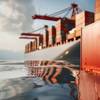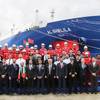A lack of infrastructure and high port and inland costs continue to limit India’s economic progress, a senior executive of global container transportation leader, APL, told a high-level shipping industry gathering this week.
Addressing the Southern Asia Ports, Logistics and Shipping conference in Mumbai, APL
President for South Asia, Kenneth Glenn, said that as global sourcing and manufacturing
continues to shift to Asian locations, foreign investors will choose to invest near ports
with world-class efficiency in port infrastructure.
Mr Glenn said: "If India can develop thriving retail and manufacturing sectors to rival its
services sector, the sky is the limit in terms of its economic potential. But currently,
inadequate infrastructure and high costs are hurting its development as an exporter to
the rest of the world."
Glenn said that by late 2008 some 25% of world container ship capacity will be
comprised of vessels of at least 6,000 TEU (twenty-foot equivalent units) but that India
does not yet have a port that can handle this class of ship. "Until India can develop these
type of global class facilities, it will not fulfill its cargo carrying potential," said Mr Glenn.
Last year, Mumbai’s Jawal Nehru Port Trust (JNPT) was the only Indian entry in the list
of the world’s top 100 container ports at number 36, with Chennai next at 109. "This
suggests that investment in ports is too fragmented and spread across too many sites of
insufficient scale," said Glenn.
"When India’s ports are assessed against the attributes of a world-class port, they do not
stack up well, lacking many of the characteristics international ship operators look for in
order to increase vessel calls."
Glenn pointed out that the imbalance of container trade towards JNPT, which
accounts for around 60% of total Indian volumes, is creating acute congestion.
However, he said that simply adding more port capacity at multiple locations is not the
answer, citing a recent analysis conducted by leading industry analyst Drewry for APL.
Subscribe for
Maritime Reporter E-News
Maritime Reporter E-News is the maritime industry's largest circulation and most authoritative ENews Service, delivered to your Email five times per week










